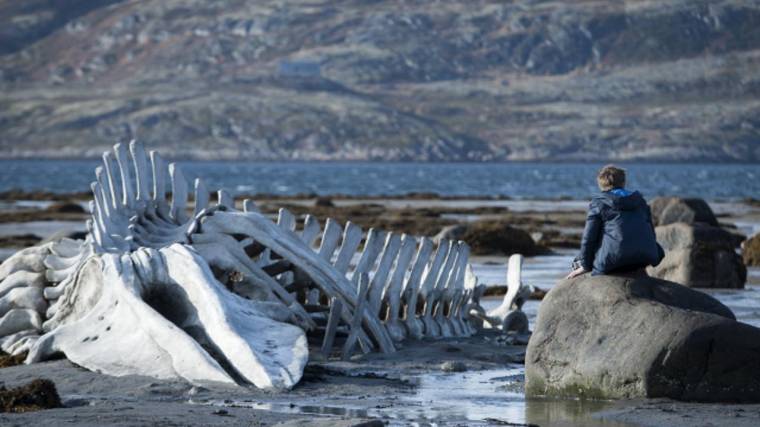-
LEVIATHAN (Andrey Zvyagintsev 2014)
Andrey Zvyagintsev: LEVIATHAN (2014)

A downward path in Russia laced with vodka
Bookended by brooding Philip Glass music (from his opera Akhnaten) and its vast unfriendly metallic-blue tinged landscape on a barren estuary by the Barrents sea in northwestern Russia, Leviathan is a film epic of rural corruption, family rot, and alcoholism whose Dostoevskian wastes are fringed with sardonic comedy. The overall picture, which most resembles the director's earlier The Banishment but comes together with more force and tension, is one of a working class crushed by a brutal Russian state with the Orthodox Church standing cooperatively by. Zvyagintsev's inspirations are the Book of Job for the travails of his macho, vodka-soaked auto mechanic hero Kolya (Alexei Serebriakov) and Hobbes' seventeenth-century treatise Leviathan, which describes a social contract designed to control human lives that otherwise will be "solitary, poor, nasty, brutish and short," or, as referred to here more than once, like those of the most dangerous animals, or of apes. On the edge of the property Kolya's family has held for generations reside, none too subtly, perhaps for the film's symbolism, the hulls of foundered ships that sit on a rugged shore like beached whales, while the great ribs of an actual dead whale loom in the mud. Symbolism aside, there is grand misery here in action unending, and though the long film glides along slowly, it holds the attention and inspires awe.
Kolya is about to lose his family property, with land, house, and adjoining auto workshop, to the fat, alcoholic, boorish mayor Vadim (Roman Madyanov) -- need we add that he is corrupt? To fight this he has engaged his old army buddy and canny Moscow lawyer friend Dimitri (Dmitri (Vladimir Vdovitchenkov). Dimitri's legal machinations (which frankly seem a bit feeble) have been getting nowhere, as we're numbingly informed in an ironic early sequence, seemingly drawn from Romanian cinema (especially Police, Adjective), in a long take with a court clerk monotonously and rapidly reading a series of moves by Kolya the court has systematically rejected. In the event, Dimitri has an ace in the hole: a thick folder full of dirt about the mayor to blackmail him into withdrawing his land grab. And it scares the man for while: but the wheels of corrupt local politics grind powerfully in a place where henchmen can tie up a victim out in the country and use him for target practice.
Kolya and some of his local working class pals get off on target practice of their own with a deeply vodka-drenched picnic (do these men ever stop pouring it down?) that memorably features taking potshots at framed portraits of Russia’s leadership from Lenin to Gorbachev. Kolya's young, mysterious and handsome younger wife Lilya (Elena Lyadova) does not stand idly by. She is frustrated with Kolya's stubborn boorishness, and she has her eye on Dimitri (they soon act on their attraction). Kolya's unhappy teenage son Romka (Sergey Pokhodaev) isn't cooperative with Lilya; she's not his mother; Roma's desperation and unhappiness make this at moments an intense coming-of-age tale, and young Pokhodaev knows how to turn on the emotion in this role.
Sometimes people drive around in Leviathan at excessive length like the characters in Nuri Bilge Ceylan's Once Upon a Time in Anatolia. But the many sequences of drinking, Roma's fireside partying with young friends in a ruined church, Kolya's brooking desperate intensity in every scene, and the appearances of a slick but unconvincing Orthodox priest, are all special to Zvygintsev's film. Ultimately this is a work that seems to glide around on its slow, well-oiled wheels with a pace and manner, a look and feel, quite its own. For me, the director's best two films are still his debut The Return and Elena. I can see the assurance, strength, and grand ambition of Leviathan, and the filmmaker's passionate involvement in his material, but I could never quite fully engage with it as I unmistakably did with those other two films.
Nevertheless this continues to bear out the feeling I've had ever since The Return that Zvyagintsev, potentially, anyway, is a cinematic master. If he falters a little, with one too many off-screen or poorly-prepared-for events, he has moved up to a higher level of complexity here, from the personal to the political, without neglecting the mythical or the biblical. He says in a statement that he still thinks it possible today to ask big questions and "find a tragic hero in our land," a "child of god," and this, he says is "precisely the reason why my homeland isn't lost yet to me." Nor is Zvyagintsev lost to the world of world cinema.
Leviathan, 140 mins., debuted at Cannes in Competition, where for some time it was deemed one of the top contenders for the Palme d'Or. It wound up winning the Best Screenplay award; it is also Russia's entry into the 87th competition for Best Foreign Film at the Academy Awards. Screened for this review at Sony Screening Room, 550 Madison Ave., NYC 29 October 2014. Its US theatrical release (NYC) is Thursday, 25 December 2014 at Film Forum and Lincoln Plaza Cinema.
Last edited by Chris Knipp; 03-09-2016 at 09:43 PM.
 Posting Permissions
Posting Permissions
- You may not post new threads
- You may not post replies
- You may not post attachments
- You may not edit your posts
-
Forum Rules





 Reply With Quote
Reply With Quote
Bookmarks